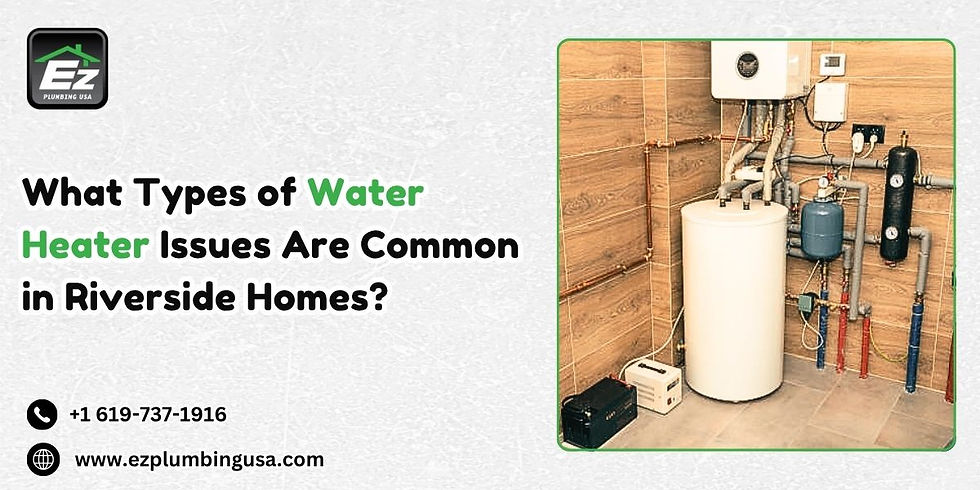What Types of Water Heater Issues Are Common in Riverside Homes?
- dj1220131
- Jun 13, 2025
- 4 min read

Introduction
Imagine stepping into your shower on a chilly morning, only to be greeted by an icy blast instead of the warm comfort you were expecting. It’s frustrating, right? In Riverside, where homeowners rely on their water heaters daily, such problems can quickly become more than just a minor inconvenience. Whether it's a leaking tank or inconsistent heating, knowing what issues to look out for—and when to seek Water Heater Repair Riverside services—can save you time, money, and a lot of cold showers.
In this guide, we’ll walk you through the most common water heater issues faced by Riverside homeowners, and how you can deal with them before they spiral into costly repairs or replacements. Let’s dive in.
1. Understanding Water Heaters in Riverside Homes
Water heaters, whether tank-style or tankless, play a key role in our daily routines. Most Riverside homes use either electric or gas water heaters. Due to the local climate and water conditions, certain issues arise more frequently than in other regions. Hard water, for example, is a common problem in Riverside and can affect the performance of your water heater over time.
2. Why Water Heaters Fail More Often in Riverside
Riverside's hard water contains high levels of minerals like calcium and magnesium. Over time, these minerals settle inside your water heater tank, causing sediment build-up. This reduces heating efficiency and increases wear and tear, leading to more frequent repairs or complete breakdowns.
3. Lack of Hot Water: What's Causing It?
This is probably the most obvious sign of a water heater issue. A lack of hot water can be caused by several things:
Malfunctioning heating element (electric heaters)
Pilot light failure (gas heaters)
Tripped breaker or blown fuse
Sediment build-up that reduces space for hot water
It's like trying to heat a pot of water that’s already filled with rocks — it takes longer and never quite gets hot enough.
4. Inconsistent Water Temperatures
One day your water is scalding hot, and the next it’s lukewarm. Sound familiar?
Fluctuating temperatures often point to:
Faulty thermostat settings
Broken heating elements
Sediment covering the heating element, making it inefficient
Regular flushing and servicing of your unit can prevent this issue.
5. Discolored or Rusty Water
If your hot water looks rusty or brownish, your water heater might be rusting from the inside. It’s a red flag for:
Corroded anode rod
Aging tank
Pipe corrosion
This usually means it’s time to replace the anode rod or start planning for a new heater.
6. Strange Noises Coming from the Tank
A rumbling, popping, or banging sound from your heater? That’s not a ghost—it’s sediment build-up causing mini-explosions as water heats under the crusted layer. This not only reduces efficiency but can lead to cracks and leaks.
7. Water Leaks Around the Heater
Water pooling around the base of your water heater may mean:
A cracked tank
Loose valves
Excess pressure
Ignoring leaks is like ignoring a dripping faucet — it can cause serious water damage if not fixed early.
8. Pilot Light Issues (for Gas Heaters)
If your pilot light keeps going out, you might be dealing with:
A faulty thermocouple
Clogged or dirty pilot light opening
Gas supply problems
It’s essential to have a pro inspect it before you try relighting it repeatedly.
9. Electric Water Heater Malfunctions
For electric units, common issues include:
Defective thermostat
Faulty heating elements
Power supply issues
These can typically be diagnosed and repaired without replacing the entire unit.
10. Mineral Build-up and Sediment Problems
Think of sediment like cholesterol for your water heater—it clogs the system and forces it to work harder. Regular flushing (at least once a year in Riverside) can:
Increase efficiency
Extend lifespan
Improve water quality
11. Smelly or Foul Odors in Hot Water
If your hot water smells like rotten eggs, bacteria could be reacting with the anode rod inside your tank. A quick fix might be:
Replacing the anode rod with a zinc-alloy type
Flushing the tank with hydrogen peroxide
12. Water Takes Too Long to Reheat
This can be super annoying, especially with multiple people in the house. Common causes include:
Undersized heater
Worn-out heating elements
Sediment insulation
Upgrading to a larger or tankless unit may help if your usage needs have changed.
13. Old and Inefficient Units
Is your heater more than 10 years old? Like all appliances, water heaters lose efficiency over time, especially in hard water areas like Riverside. Signs it's time to replace:
Frequent repairs
Rising energy bills
Lukewarm water despite full settings
14. How to Prevent Water Heater Issues in Riverside
Prevention is better than repair, especially when it comes to water heaters. Here’s what you can do:
Flush the tank annually
Inspect the anode rod every 2–3 years
Check temperature settings (120°F is ideal)
Install a water softener to combat hard water
These simple steps can double your heater’s lifespan.
15. When to Call for Water Heater Repair Riverside
If your DIY fixes aren’t cutting it, or the issue keeps recurring, it’s time to call the pros. A certified technician in Water Heater Repair Riverside will:
Diagnose the root cause quickly
Recommend cost-effective solutions
Ensure safety and compliance
Conclusion
Your water heater works silently behind the scenes—until it doesn’t. Riverside homeowners face unique challenges thanks to the hard water and warm climate, but with regular care and timely professional help, most water heater issues can be easily managed or avoided altogether.
EZ Plumbing USA started its business to satisfy clients by providing prompt, high-quality service. Even with so many competitors in the market, we strive to be the best. Our mission is to deliver exceptional plumbing services while keeping your house dry and secure. Contact us now for more information.




Comments